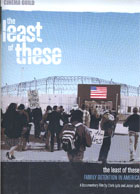
The Least of These: Family Detention in America 2009
Distributed by Cinema Guild, 115 West 30th Street, Suite 800, New York, NY 10001; 212-685-6242
Produced by Marcy Garriott, Clark Lyda, Jesse Lyda
Directed by Clark Lyda and Jesse Lyda
DVD, color, 62 min.
Sr. High - Adult
Human Rights, Criminal Justice, International Relations
Date Entered: 07/15/2009
Reviewed by Brian Falato, University of South Florida Tampa Campus LibraryIn 2006, U.S. policies regarding those who come into the country without proper documentation was changed. Previously, those caught without the proper paperwork had been released and told to report for their immigration hearing at a later date. Now they could be detained until the hearing. Families who were undocumented would be kept together in a detention facility. A former jail in Taylor, Texas was opened in May 2006 to house these families awaiting hearings. The T. Don Hutto Residential Center, as it was called, was operated not by the government, but by a private, for-profit operation called Corrections Corporation of America. The Least of These documents the controversy surrounding the Hutto Center and the principles behind family detention.
Immigration is a hot-button topic, and, especially in the post 9/11 era, some Americans feel that all those coming into the country without proper authorization deserve to be locked up. But as is pointed out in the video, a “very significant percentage” of those detained at Hutto are seeking asylum in the U.S. Victims of political persecution, and sometimes domestic violence, they feel they have no choice but to leave their home country. To go through the authorized channels to get the required paperwork to come to the U.S., however, is pointless for government opponents and simply not feasible for many. Asylum cannot be applied for until one is in the U.S. So while the families wait for their asylum hearing, they are kept at Hutto.
Although no one there has been convicted of a crime, the living conditions made them feel like criminals. Nothing could be placed on the walls, children were not allowed to keep toys, and families had only 15 minutes to eat. Education for the children was limited to one hour a day.
Protests over these conditions did bring some change at Hutto, but the American Civil Liberties Union in Texas still sued, saying Hutto violated the terms of the Flores v. Reno court ruling that set certain standards for detention of children. The ACLU was hoping a judge would rule that Hutto should be shut down. This did not happen, but the court did require changes in how Hutto was run. Children now receive 5 hours of education a day, walls are allowed to be decorated, and detention officers cannot refer to the detainees as prisoners or open their mail. The Hutto Center is operating under external supervision by a federal magistrate until August 2009. The ethical concern over detaining children was not addressed. The government has said family detention centers allow families to stay together in detention, where previously they were separated. Alternatives to detention are mentioned in the video, and they not only cost less than operating the centers, they are successful in getting people to show up for their immigration hearings. Some of the detainees seen in the video have been subsequently released and can stay in the U.S. while they await their hearings.
The end of the video features archival footage of Barack Obama as a presidential candidate quoting from Matthew in the Bible: “Whatever you do for the least of my brothers, you do to me.” Whether the Obama administration will change the policies regarding family detention is not known. But the video raises important questions, and is recommended for all libraries.